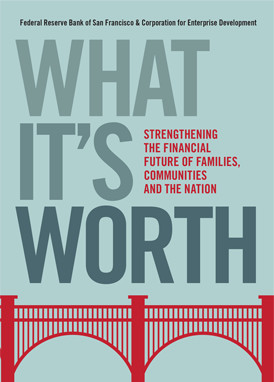Getting hired is one thing; developing skills to advance in a living-wage job, and managing a budget so earnings go further, are quite another. In a new book, What It’s Worth: Strengthening the Financial Future of Families, Communities and the Nation, LISC President & CEO Michael Rubinger describes how learning to build earnings, assets and credit can change the outlook for low-income Americans. Published by the San Francisco Federal Reserve Bank and the Corporation for Enterprise Development (CFED), with support from Citi Foundation, the book includes essays from 40 national experts, including Rubinger, on what it takes to grow economic opportunity across the country.
The excerpt below is from:
"Making Work Pay: Building Financial Health Improves Employment Outcomes"
in What It’s Worth: Strengthening the Financial Future of Families, Communities and the Nation
In the world of community development, we have come to understand that revitalizing a neighborhood demands a holistic approach. Affordable housing, community safety and health, economic development, quality education, financial opportunity — each of these forms a mutually reinforcing strand in the well-being of a place and the people who live there. A neighborhood cannot transcend poverty without comprehensive support in all of these areas. The same truth applies for individuals. Supporting people along the path to financial health requires tackling all the facets of financial life. A job, though essential, is not enough.
At the outset of my career, I was assistant commissioner for the New York City Department of Employment and observed dozens of job training and workforce development programs brimming with good ideas and intentions. They placed thousands of New Yorkers in jobs every year. But what these programs could not do, despite offering skills training, on-the-job support, and all manner of follow-through, was to ensure that people kept those jobs and remained steadily employed. We saw clients chronically losing or leaving work, exacerbating the very cycle of debt and poverty we were trying to break. We understood why people became unemployed. If a child got sick or a car broke down, a worker might not have the means to hire a caretaker or repair the car, leaving him or her at risk of missing work and losing pay or being fired. What we didn’t know was how to reverse the trend.

During the past 10 years, we at the Local Initiatives Support Corporation (LISC), the nation’s largest community development intermediary, have been working to break the cycle of job placement and abandonment. To do so, we have embraced a comprehensive approach, carried out through our Financial Opportunity Centers (FOCs), that recognizes the multi-faceted nature of financial well-being. Continued[+]...
- Read the press release.
- Download the book or order a printed copy.
